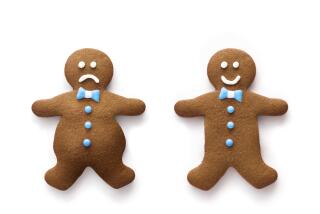Stereotyped -- and believing it
- Share via
Overweight and obese people share many of the same views about their hefty counterparts as do thinner folks. And such attitudes are emerging as key factors in weight control.
A number of studies have documented a pervasive bias against fat people, who often earn less than their thinner counterparts. Other research has found discrimination against corpulent men and women in a variety of places, including healthcare. And public opinion polls have noted that those who weigh too much are routinely stereotyped as lazy, slow and unmotivated compared with people at a healthier weight, who are more likely to be described as smart, competent and attractive.
“It is another hurdle to weight loss,” says Marlene B. Schwartz, associate director of the Yale University’s Rudd Center for Food Policy and Obesity and coauthor of a recent study examining the effect of one’s own body weight on fat bias.
Published earlier this year, the study of 4,286 people is one of the first to examine attitudes about obesity in people of all body weights. Like previous studies, it found that a large proportion of lean people have negative opinions about the obese.
The majority of underweight, normal weight and even overweight people in the study said they preferred thin people to fat ones. But “anti-fat attitudes were moderately strong even among extremely obese respondents,” the team reports in a recent issue of Obesity Research. Nearly 40% of obese participants and more than a quarter of extremely obese study subjects said they felt the same about fat people.
When the researchers probed more, asking about other negative traits linked to excess body weight, they found similar levels of fat stereotyping among all participants, regardless of their own weight. The results were consistent even when the researchers controlled for gender, age, nationality, education, number of overweight friends and relatives, perceived understanding of what it is like to be obese and satisfaction with one’s own body weight.
How deep the fat bias runs is illustrated by some of the trade-offs that participants said they would be willing to make to avoid being obese.
Nearly half said they would swap one year of life rather than be fat, while 15% reported that they’d give up 10 years or more. About a third of respondents said they’d rather get divorced than be obese. One in five participants said that they’d prefer to be childless; 15% said that they’d pick severe depression over obesity and 14% chose alcoholism over girth.
These fat attitudes also extended to obese children, although not as strongly: 10% of participants reported that they would rather have a child who suffered from the eating disorder anorexia than obesity; 8% said they’d prefer to have an offspring with a learning disorder.
The findings illustrate the stigma and blame that often surround obesity, even among those who carry a lot of unwanted pounds themselves.
“Hating yourself is not a good way to motivate yourself to engage in healthier behaviors,” Schwartz says, noting that “if you have been so conditioned to see yourself as lazy, that has to get in your way when you are trying to go outside to take a walk or take the stairs instead of the elevator.”
Non-obesity related research shows the effect that stereotypes of any kind can have on performance. It’s a common belief, for example, that girls do worse on math than boys and that people of Asian heritage have a mathematical edge over other racial groups.
To examine how stereotypes might affect performance, Yale University’s Geoffrey Cohen gave math tests to Asian American girls. On one day, he had the girls note just gender on the top of the test. On another, he had them note only their race. When the girls noted their gender, they performed more poorly than when they listed their race -- more evidence, Schwartz says, that “the subtle ways you see yourself can affect your performance.”
To help her overweight and obese clients counter the pervasive stereotypes about fat people -- as well as their own beliefs -- Schwartz encourages them to focus on all the ways that they perform well.
“People can think about how hard-working, motivated and strong they are in other domains of their lives,” she says. “It’s important to keep that in mind as they try to focus on changing their eating or exercise behavior. You want to keep reminding yourself of all the strengths that you do have because the more confident you are that you can succeed at weight loss, the higher the likelihood that you will be successful.”






